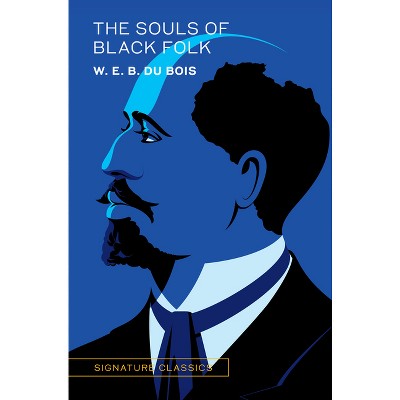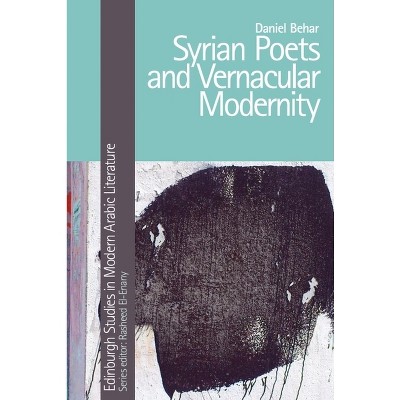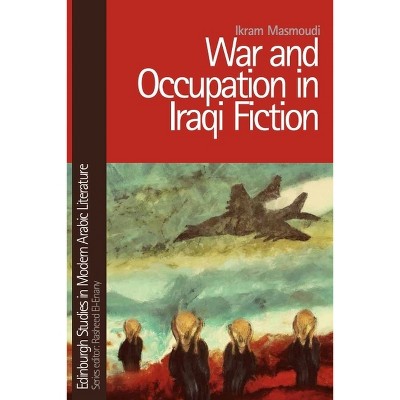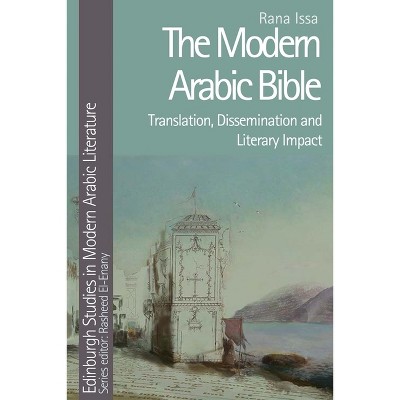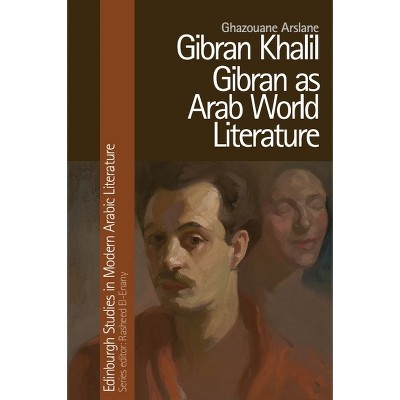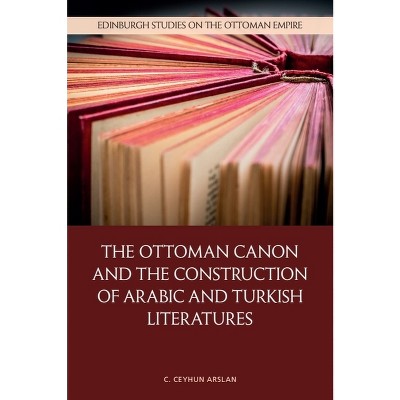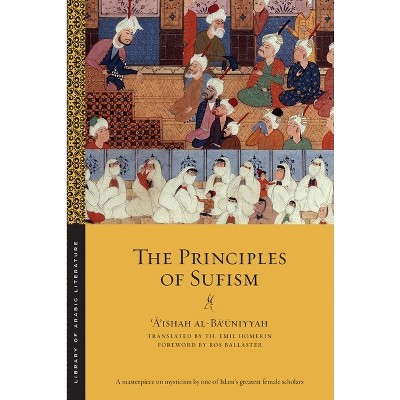Sponsored

Sufism in the Contemporary Arabic Novel - (Edinburgh Studies in Modern Arabic Literature) by Ziad Elmarsafy (Hardcover)
In Stock
Sponsored
About this item
Highlights
- Sufi characters - saints, dervishes, wanderers - occur regularly in modern Arabic literature.
- About the Author: Ziad Elmarsafy is Professor in the Department of English and Related Literature at the University of York.
- 256 Pages
- Literary Collections, General
- Series Name: Edinburgh Studies in Modern Arabic Literature
Description
About the Book
This book will present close readings of three contemporary Arabic novelists - an Egyptian (Gamal Al-Ghitany), an Algerian (Taher Ouettar) and a Touareg Libyan (Ibrahim Al-Koni) - who have all turned to Sufism as a literary strategy aimed at negotiating issues both literary and political.
Book Synopsis
Sufi characters - saints, dervishes, wanderers - occur regularly in modern Arabic literature. A select group of novelists to interrogate Sufism as a system of thought and language. In the work of writers like Naguib Mahfouz, Gamal Al-Ghitany, Taher Ouettar, Ibrahim Al-Koni, Mahmud Al-Mas'adi and Tayeb Salih we see a strong intertextual relationship with the Sufi masters of the past, including Al-Hallaj, Ibn Arabi, Al-Niffari and Al-Suhrawardi. This relationship becomes a means of interrogating the limits of the creative self, individuality, rationality and the manifold possibilities offered by literature, seeking in a dialogue with the mystical heritage a way of preserving a self under siege from the overwhelming forces of oppression and reaction that have characterised the late 20th and early 21st centuries.
From the Back Cover
Edinburgh Studies in Modern Arabic Literature Series Editor: Rasheed El-Enany This series, dedicated to the study of modern Arabic literature, is unique and unprecedented. It includes contemporary genre studies, single-author studies, studies of particular movements, trends, groupings, themes and periods in Modern Arabic Literature, as well as country/ region-based studies. 'Elmarsafy is to be commended on the ambitious project to encompass a large geographic expanse, and his selections are meant to be illustrative rather than encyclopedic. The work is meticulously detailed.' Celene Ayat Lizzio, Journal of Postcolonial Writing 'I genuinely enjoyed reading Elmarsafy's well-researched analysis and presentation of contemporary Arab novelists...his book will be a solid companion for all who want to develop their thinking and knowledge of Sufism and Arabic literature.' Göran Larsson, Islam and Christian-Muslim Relations Studies the use of Sufi ideas, language and themes in Arabic fiction from 1945 to the present. Although Sufi characters--saints, dervishes, wanderers--occur regularly in modern Arabic literature, a select group of novelists seeks to employ Sufism as a system of thought and language for literary ends. In the work of writers like Naguib Mahfouz, Gamal Al-Ghitany, Tahar Ouettar, Ibrahim Al-Koni, Mahmud Al-Mas'adi and Tayeb Salih we see a strong intertextual relationship with the Sufi masters of the past, including Al-Hallaj, Ibn Arabi, Al-Niffari and Al-Suhrawardi. This relationship becomes a means of interrogating the limits of the creative self, individuality, rationality and the manifold possibilities offered by literature, seeking in a dialogue with the mystical heritage a way of preserving a self under siege from the overwhelming forces of oppression and reaction that have characterized the late twentieth and early twenty-first centuries. Key Features Covers a broad range of modern Arabic novelists including Naguib Mahfouz and Tayeb Salih Focuses on Sufism in fiction rather than in poetry (where it is most often discussed) Studies authors such as Al-Koni and Ouettar who have received little critical attention in English Ziad Elmarsafy is Reader in the Department of English and Related Literature at the University of York. He is author of /The Enlightenment Qur'an: The Politics of Translation and the Construction of Islam/ (2009) and co-editor, with Anna Bernard and David Attwell, of Debating Orientalism (2013).Review Quotes
Elmarsafy brings together an illustrative spectrum of seminal Arab authors, and ably illuminates the persistence of Sufi idioms and voices in contemporary literary texts. He argues convincingly that these appropriations are intricately linked not only to questions of besieged national identities and ideological bankruptcy, but perhaps more pressingly to aspects of the journey of the self, the limits of the language and form of the novel, and ultimately, the very habitability of the world of the writer.--Samia Mehrez, Professor of Arabic Literature, American University in Cairo
Elmarsafy is to be commended on the ambitious project to encompass a large geographic expanse, and his selections are meant to be illustrative rather than encyclopedic. The work is meticulously detailed.-- "Celene Ayat Lizzio, Journal of Postcolonial Writing"
I genuinely enjoyed reading Elmarsafy's well researched analysis and presentation of contemporary Arab novelists...I am sure that his book will be a solid companion for all who want to develop their thinking and knowledge of Sufism and Arabic literature.'--Göran Larsson, University of Gothenburg "Islam and Christian-Muslim Relations"
I genuinely enjoyed reading Elmarsafy's well-researched analysis and presentation of contemporary Arab novelists...his book will be a solid companion for all who want to develop their thinking and knowledge of Sufism and Arabic literature.-- "Göran Larsson, Islam and Christian-Muslim Relations"
Readers interested in how a particular work fits into the broader arabophone literary scene will appreciate Elmarsafy's thorough indexing, while those familiar with Arabic will also appreciate lengthy quotations from the original works in over 60 pages of endnotes. The volume has a helpful bibliography including plentiful French-language scholarship on Arabic literature, fiction, and literary theory more generally. Elmarsafy is to be commended on the ambitious project to encompass a large geographic expanse, and his selections are meant to be illustrative rather than encyclopedic. The work is meticulously detailed; hence, a reader new to the field would necessarily read this work alongside a more introductory survey of trends in modern Arabic fiction.--Celene Ayat Lizzio, Brandeis University "Journal of Postcolonial Writing"
About the Author
Ziad Elmarsafy is Professor in the Department of English and Related Literature at the University of York. In the past he taught at the University of California, Riverside, Wellesley College and New York University. He is the author of The Enlightenment Qur'an: The Politics of Translation and the Construction of Islam (Oneworld, 2009), and co-editor, with Anna Bernard and David Attwell, of Debating Orientalism (Palgrave Macmillan, 2013).
Shipping details
Return details
Frequently bought together
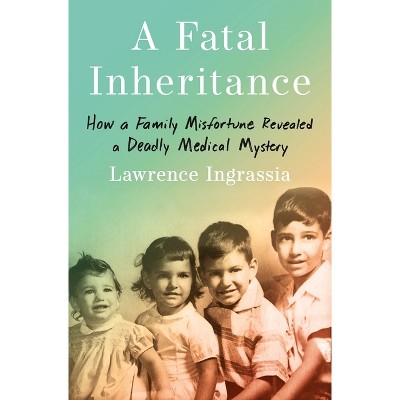
Trending Literary Fiction







